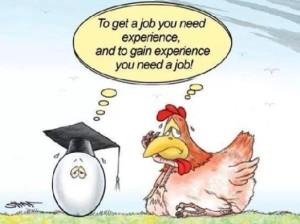Is there such a thing as Professional Loyalty?

This is my first post in quite some time. Please note that I have not been negating my commitment to helping others maximize their potential. I recently conducted a two-day Career Development workshop and a forum where I gave the key-note, that I spent several months preparing for. I am happy to say that the feedback has been outstanding. The ideals and philosophies that I have been sharing on this blog and in my book,
How To Make It From The Classroom To The Cubicle, have been put into practical form. The exciting news is that there are more training workshops and forums already scheduled! Contact me and I will gladly provide details.
Today though, we will talk about an important topic as you consider the pathway to professional success:
Is there such a thing as Professional Loyalty? In government based jobs such as teaching, fire services, law enforcement, etc., it is still common place to see individuals enter and remain for their entire career within the same office or district. However outside of this the story is very different. Gone are the days of entering a job out of school and staying within the same organization or in the same location for an entire career. It still happens but is much more infrequent. Recent graduates and those who are about to enter the workforce must be prepared for this reality, but what about the rest of us?
In a very dynamic economic climate things change rapidly. One day your company and industry can be high flying and the next year management may decide or forced to close up shop. There is also the disturbing trend of massive layoffs or compensation cuts simply to balance the books; which results in employers asking employees to achieve more with fewer resources. The long term employment outlook is being impacted by economic factors that are beyond the control of the employees. Employees now have the responsibility to consider these factors alongside their career advancement aspirations when deciding if they should leave or go. With this in mind, employers may decide to offer promises of future rewards if employees stay loyal, however what should you do?
The answer is not so simple, but here are some assessment criteria that will help you determine whether to stay or go:
Just because others are being let go or are leaving voluntarily does not mean you must do the same.
When people leave, a vacuum is created, meaning that there are things that they previously did that aren't getting done anymore. That means that there are potential opportunities for you to take advantage of. If the premise for leaving is to get more opportunities, then there is reason to stay in a case like this. However, if time is passing by and you are aggressively trying, but not getting access to those opportunities or management has made promises that seem to be indefinite, then it is time to move on.
You were hired to fill a position, with a promise for career growth and things are threatening to become stagnant.
Ask for time frame commitment. We all know that things change especially in the life of a company. Business needs evolve, priorities evolve and management is always trying to keep things aligned. Though context may change, a commitment for employee growth and development should not. As a manager I have learned that when there are no opportunities, make one. In other words management should NOT go back on promises made when it comes to employee advancement. If over a period of time nothing is happening the manager should bring it to their employee's attention so that things can be re-evaluated. However, if after doing so, the attitude and actions do not match promises made, then you know that it is time to go.
Growth can be achieved organically or via transplant.
Just like in botany, there comes a time when decisions have to be made as to whether there is room for growth or if the only opportunities exist elsewhere. It is really up to you as the employee to make this assessment. Very few employers would be pragmatic enough to make this call for you as such a decision is really in the best interest of the employee only. Sometimes the move can be a different role within the same organization. Contextually it is a new job, but consider that the culture, general work environment and the aforementioned economic factors would probably be the similar if not the same.
Fundamentally, loyalty is a two-way street. As an employee, you should be as loyal as the employer is loyal to you. If things are not exactly perfect, but there is constant reassurance from management that they will honor their commitment to you, then that is worthy of holding on to. However, if there is nothing but empty or broken promises and a general apathy to your overall growth, then RUN! Unfortunately in my tenure I have seen many folks stay when they definitely should have left and companies allow promising employees to leave when there was good reason to incentivize their staying.
I will summarize it by saying as long as you have evidence as to why you should stay then stay, but if after an honest assessment you determine that there is no commitment toward your growth AND there are no opportunities for you to take advantage of, then it is time to move on. To simply answer today's question,
yes there is such a thing as professional loyalty; it is a shared responsibility between the employer and employee.
Until next time remember:
as long as you have life you should live it to your fullest potential.
Tags: career,
career development,
Deon,
Deon Duncan,
Deon E Duncan,
Duncan,
How to make it from the classroom to the cubicle,
job search,
loyalty,
self development,
self management,
weekly wisdom  I overheard a conversation on the train while heading to work one day that made me think. It was between two young ladies (both their early to mid-thirties by my estimation) talking about career aspirations. One started by saying she was morbidly afraid of being a lifer: a term used to describe criminals who have been sentenced to life in prison, with no chance of parole. Of course she was using this in the context of being stuck at the same job or in the same position for her entire working career. My ears perked up, because to me, that was a very valid fear and should serve as motivation to keep one looking for fresh opportunities for development and progress. Intrigued, I began to listen more intently and a few moments later the conversation took an interesting turn.
In her response, the other young lady stated that her biggest fear was being a manager. She then went into a five minute, expletive filled diatribe about why she felt so strongly about it. Here is a summary of what she said (minus the expletives of course): “Managers have too much responsibility. If something goes wrong with anyone on the team, it is
the manager’s problem. Managers have to be involved in everything. Managers always have to come early and be the last ones to leave.” She rounded off her contribution by expressing her desire to work autonomously and be responsible for just herself. This sentiment seems to be increasing in popularity, but it was not always this way.
I recall over 10 years ago when I was just starting my professional journey, I believed that a sign of progress and development was being responsible for someone else. That could have meant being a mentor, team lead, supervisor or an official manager. This mindset was adopted because there was and still is a widely accepted practice of taking the most tenured or experienced hire and making them manager over others. That implies that elapsed time makes you a perfect choice to become a manager.
Fast forward ten years and I have realized that this ideal is an absolute mistake. While it is true that experience is a contributing factor in making a good manager, people skills and other intangibles are far more important. What I have experienced is that if you are incapable and unwilling to shoulder the responsibility required in helping develop and
motivate others, while ensuring that the department and company goals are being achieved, then you are not the one for the job.
For the majority of us, we learn about management from experience with the managers that we have. If we had horrible experiences, we are going to be either inspired to be better or shy away from it entirely. In the new professional climate, there are many individuals opting to stay away from managing in general and are very content playing the role of an individual contributor. With an upward trend in the use of contract and freelance workers in several industries that may have been traditionally staffed by full time employees, many feel secure in focusing on the role of expert. Despite this, there is no escaping having to work in teams or being accountable to a manager or supervisor.
So back to the second lady from the conversation mentioned above. Her disposition is totally fine and if her reasoning is anything like I described then it makes perfect sense. Not aspiring to be a manager should not affect your development if all you desire is to focus on and develop your expertise. However, for this to happen you must be in an environment that facilitates that desire. Pay careful attention to this point because many places views progress as the only way to reward good performers and shying away from managing in such an arena only serves to alienate you, which could negatively affect your career.
As I close, I admonish that you should really only chase after being a manager if you are prepared for the work that it takes to be effective. Other than that it is perfectly fine to steer clear of it. Management is not for everyone. I am sure anyone who has or had a bad manager will definitely concur. However, the role of an individual contributor can be as equally a viable pathway to building a successful career. Do what is right or you!
Until next time remember: as long as you have life you should live it to your fullest potential.
I overheard a conversation on the train while heading to work one day that made me think. It was between two young ladies (both their early to mid-thirties by my estimation) talking about career aspirations. One started by saying she was morbidly afraid of being a lifer: a term used to describe criminals who have been sentenced to life in prison, with no chance of parole. Of course she was using this in the context of being stuck at the same job or in the same position for her entire working career. My ears perked up, because to me, that was a very valid fear and should serve as motivation to keep one looking for fresh opportunities for development and progress. Intrigued, I began to listen more intently and a few moments later the conversation took an interesting turn.
In her response, the other young lady stated that her biggest fear was being a manager. She then went into a five minute, expletive filled diatribe about why she felt so strongly about it. Here is a summary of what she said (minus the expletives of course): “Managers have too much responsibility. If something goes wrong with anyone on the team, it is
the manager’s problem. Managers have to be involved in everything. Managers always have to come early and be the last ones to leave.” She rounded off her contribution by expressing her desire to work autonomously and be responsible for just herself. This sentiment seems to be increasing in popularity, but it was not always this way.
I recall over 10 years ago when I was just starting my professional journey, I believed that a sign of progress and development was being responsible for someone else. That could have meant being a mentor, team lead, supervisor or an official manager. This mindset was adopted because there was and still is a widely accepted practice of taking the most tenured or experienced hire and making them manager over others. That implies that elapsed time makes you a perfect choice to become a manager.
Fast forward ten years and I have realized that this ideal is an absolute mistake. While it is true that experience is a contributing factor in making a good manager, people skills and other intangibles are far more important. What I have experienced is that if you are incapable and unwilling to shoulder the responsibility required in helping develop and
motivate others, while ensuring that the department and company goals are being achieved, then you are not the one for the job.
For the majority of us, we learn about management from experience with the managers that we have. If we had horrible experiences, we are going to be either inspired to be better or shy away from it entirely. In the new professional climate, there are many individuals opting to stay away from managing in general and are very content playing the role of an individual contributor. With an upward trend in the use of contract and freelance workers in several industries that may have been traditionally staffed by full time employees, many feel secure in focusing on the role of expert. Despite this, there is no escaping having to work in teams or being accountable to a manager or supervisor.
So back to the second lady from the conversation mentioned above. Her disposition is totally fine and if her reasoning is anything like I described then it makes perfect sense. Not aspiring to be a manager should not affect your development if all you desire is to focus on and develop your expertise. However, for this to happen you must be in an environment that facilitates that desire. Pay careful attention to this point because many places views progress as the only way to reward good performers and shying away from managing in such an arena only serves to alienate you, which could negatively affect your career.
As I close, I admonish that you should really only chase after being a manager if you are prepared for the work that it takes to be effective. Other than that it is perfectly fine to steer clear of it. Management is not for everyone. I am sure anyone who has or had a bad manager will definitely concur. However, the role of an individual contributor can be as equally a viable pathway to building a successful career. Do what is right or you!
Until next time remember: as long as you have life you should live it to your fullest potential.









